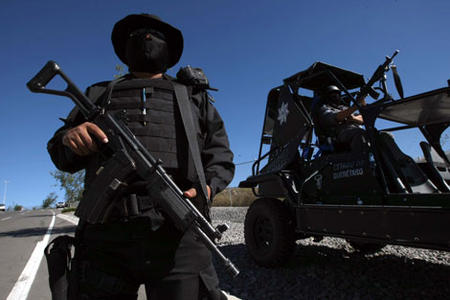Just a few days after President Felipe Calderón, in an interview with New York Times reporters, excoriated the opposition Institutional Revolutionary Party (PRI) for wanting to pact and dialogue with Mexico’s drug traffickers (a charge PRIistas vigorously deny), his position was undermined by a proposal of a prominent member of his own party and by some comments made by U.S. officials.
 First, former president Vicente Fox, of Calderón’s own National Action Party (PAN) came out with a highly publicized proposal to do exactly what Calderón has pledged never to do: arrange a ceasefire with the narcos and start talking. Second, a subsequent Times story, written by Ginger Thompson, revealed that U.S. agents were already making deals with some narcos to undercut the power of other, presumably more dangerous narcos.
First, former president Vicente Fox, of Calderón’s own National Action Party (PAN) came out with a highly publicized proposal to do exactly what Calderón has pledged never to do: arrange a ceasefire with the narcos and start talking. Second, a subsequent Times story, written by Ginger Thompson, revealed that U.S. agents were already making deals with some narcos to undercut the power of other, presumably more dangerous narcos.
Calderón, speaking with Times reporters on October 15, remarked that, “There are many in the PRI who think the deals of the past would work now. I don’t see what deal could be done, but that is the mentality many of them have. If that opinion prevails it would worry me.”
But speaking to the arch-libertarian Cato Institute in Washington, ex-president Fox proposed a dialogue between the government and the cartels to put an end to the out-of-control violence that is sweeping Mexico. He reiterated his long-held (both libertarian and pragmatic) proposal to legalize currently illicit drugs while calling for a return of Mexico’s military to the barracks.
At the same time, the relation between Calderón’s war and various institutions of the U.S. government is becoming less and less clear, and it appears that the president may not have all that much control over his own policies. It seems that both the Department of Homeland Security and the Drug Enforcement Agency have been covertly intervening in Mexico, and have already been dialoging with certain cartels in an effort to get rid of others.
Former Drug Czar, General Barry McCaffrey, in a talk to the Homeland Security Policy Institute in Washington last week, hinted that the Mexican government might well be supporting the efforts of the Sinaloa Cartel to rid Mexico of the murderous group called Los Zetas. At the same time, an investigative article by New York Times reporter Ginger Thompson cited current and former U.S. officials as saying that “Washington’s networks of informants have grown” in Mexico, helping “Mexican authorities capture or kill about two dozen high-ranking and midlevel drug traffickers, and sometimes have given American counternarcotics agents access to the top leaders of the cartels they are trying to dismantle.”
All this suggests that Calderón’s drug war is, in fact, a key part of the U.S. drug war, and that, in addition to putting the military on the streets, it involves differentiating among the cartels, even covertly supporting the activities of some in order in order to undercut the more dangerous activities of others—precisely Calderón’s version of the old PRI strategy.
As we have written here before, since the U.S.-promoted Drug War began in the early 1980s, its successes in Mexico (and elsewhere) have been minimal. Indeed, each seemingly successful crackdown has produced what Mexican law enforcers call a “cockroach effect,” the movement of illicit production and trade from a heavily policed area to one that is friendlier to the industry. That is how, in the wake of the South Florida Drug Taskforce’s crackdown on drug shipments into Miami in the 1980s, Mexico became the principal transshipment route of South American cocaine to the United States.
It should be clear by now that police and military action alone will not break up an illicit multi-billion dollar industry. Until U.S. demand and Mexican economic need are brought under control (or the flow of drugs is decriminalized and regulated), Mexico’s ruthless, illicit drug trade will flourish, even if its leaders enjoy shorter and shorter life spans.
For more on the Mexican drug war, read the May/June 2011 NACLA Report "Mexico's Drug Crisis." For more from Fred Rosen's blog, "Mexico, Bewildered and Contested," visit nacla.org/blog/mexico-bewildered-contested. You can also read NACLA blogs, Border Wars or Traffick Jam, for more on the U.S.-Mexico border or drug trafficking in the region.

